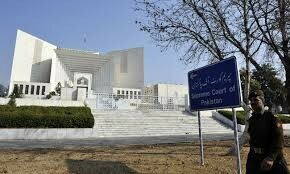BAKU: A panel discussion organised at the Pakistan Pavilion on Thursday — on the sidelines of the COP29 summit — underscored the importance of the judiciary in the quest for climate justice, arguing the judicial bodies can help address the urgent environmental challenges with socioeconomic and developmental challenges, particularly in the Global South.
The session, titled ‘Judicial Pathways Towards Climate Justice: Judicial Approaches for Addressing Climate Change Through Global Analysis’ featured Supreme Court judges Syed Mansoor Ali Shah and Ayesha Malik, as well as Lahore High Court judge Jawwad Hassan and Senator Sherry Rehman, alongside other climate experts.
The panel, which featured prominent judges and legal experts from around the world, explored how judicial systems could play a pivotal role in advancing climate justice.
Speaking at the event, Prime Minister’s Coordinator for Climate Change Romina Khurshid Alam emphasised the need for vulnerable countries to come together and unite in the fight for climate justice, said a statement issued by the climate ministry.
On COP29 sidelines, Justice Mansoor Ali Shah chairs panel discussion at Pakistan Pavilion
She said it was basically her initiative to establish a platform for international judges dedicated to climate justice as a part of Pakistan’s push for climate finance for the Global South.
She highlighted the growing importance of judicial systems in the face of escalating climate impacts, noting that courts have become vital spaces for addressing climate justice.
These judicial bodies are tasked with balancing the urgent environmental challenges with the socio-economic and developmental needs, particularly in the Global South, where such issues are especially pressing, she added.
Justice Mansoor Ali Shah, who chaired the session, emphasised that climate finance was now a fundamental human right.
He lauded the PM aide for organising a panel discussion on judicial approaches to addressing climate change in the Asia-Pacific region.
“Without climate finance, there is no mitigation or adaptation,” he stated. “It is the lifeline for climate resilience, and the Global South cannot bear the burden alone.”
Justice Shah also discussed Pakistan’s legal framework on climate change, highlighting the country’s landmark judgements on holding corporations accountable and stopping environmentally harmful development projects.
He called for stronger legal frameworks to ensure climate finance flows to where it is most needed. “Climate justice is not just an environmental issue; it is a moral and social obligation,” he said. “We need to consider it as a climate debt owed by the Global North.”
Senator Sherry Rehman, chairperson of Pakistan’s Senate Standing Committee on Climate Change, opened the discussion with a stark reminder of the growing climate crisis. She stressed that while Pakistan contributes less than one percent of global carbon emissions, it remains one of the most vulnerable nations to climate-related disasters, including the catastrophic 2022 floods that affected one-third of the country.
Senator Rehman underscored the growing gap in climate finance and the need for an equitable distribution of resources to help vulnerable nations adapt to the impacts of climate change.
“The tool that will unlock justice for the Global South is climate finance,” she said. “But the financing gap is widening, and the Global South is being left behind.”
Justice Sapana Malla of the Supreme Court of Nepal, discussed how Nepal expanded environmental rights through judicial activism and constitutional reforms, while Justice Antonio Herman Benjamin of Brazil highlighted the challenges faced by judges in passing verdicts on climate disasters.
A major theme throughout the discussion was the need for a judicial coalition of the V20 countries — a group of nations most vulnerable to climate change.
In addition to discussing climate finance, the panel also addressed the intersection of climate justice with gender, transboundary air pollution, and the challenges of implementing international climate agreements, such as the Paris Accord.
Justice Luc Lavrysen, president of the Constitutional Court of Belgium, argued that states must protect their citizens from the effects of climate change and bring net-zero emissions to reality. “The legal system is a central actor in the climate change debate,” he said.
Published in Dawn, November 16th, 2024












































